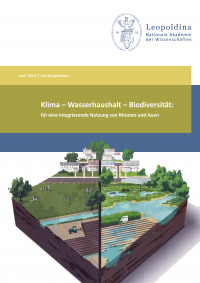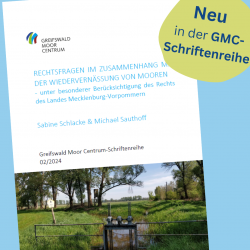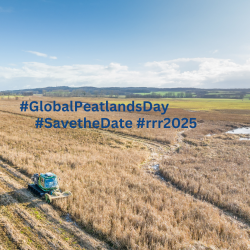News
June 2024
Climate, water, biodiversity in peatlands and floodplains
by Dorothee Scheuch (comments: 0)
Statement of the Leopoldina

27/06/2024 Climate, water, biodiversity - how this is connected in peatlands and floodplains, what condition it is in and how it can be improved - is now summarized in Climate - Water Balance - Biodiversity: For an integrative use of moors and floodplains, the statement published today by the German National Academy of Sciences Leopoldina. "Nowhere in Central Europe is biodiversity as high as in these wetlands," says Leopoldina member Prof. Dr. Klement Tockner, Director General of the Senckenberg Gesellschaft für Naturforschung. Near-natural peatlands and floodplains are also essential for preventing flood disasters and reducing CO2 emissions. The statement with supplementary digital dossier emphasizes the need to rewet peatlands and restore floodplains. Both are already enshrined as climate and biodiversity goals, for the EU for example in the Nature Restoration Law recently adopted by the EU Environment Council and worldwide in the UN Convention on Biological Diversity. The latter provides for the protection and restoration of at least 30% of the world's land, freshwater and marine areas by 2030. The statement now presents options for action to achieve national and international commitments in climate, water and biodiversity protection and still be able to use these areas economically. This includes protecting intact peatlands, switching to paludiculture, rewarding ecosystem services and including the measures in CO2 emissions trading. Twelve scientists from the fields of ecology, biology, hydrology, sociology, agricultural engineering, environmental economics and law were involved - including Dr. Franziska Tanneberger and Prof. Jürgen Kreyling, two scientists from the Greifswald Mire Centre.
What's the problem?
by Dorothee Scheuch (comments: 0)
New legal opinion reveals obstacles

26/06/2024 With their vegetation and soils, terrestrial ecosystems such as intact peatlands, floodplains and forests are valuable carbon reservoirs and sinks. However, rapid restoration often fails due to legal obstacles. The new report "Legal issues in connection with the rewetting of peatlands" in the GMC publication series provides a comprehensive analysis and shows possible solutions for the implementation of peatland climate protection. The rewetting of peatlands and their sustainable wet use, paludiculture, play a major role in natural climate protection. There are particular obstacles in terms of land availability, planning and approval. The German government's Natural Climate Protection Action Program aims to protect and strengthen these endangered ecosystems - and to understand and remove the obstacles that stand in the way of restoring these valuable areas. The new legal opinion by Prof. Dr. Sabine Schlacke and Prof. Dr. Michael Sauthoff makes an important contribution to this. It was drawn up as part of the MoKKa - Moorland Climate Protection through Capacity Building project, in which the Succow Foundation, the University of Greifswald and the Baltic Sea Foundation are working together. The results of the report will be presented today at the "Fachforum: Natürlichen Klimaschutz beschleunigen - Rechtliche Rahmenbedingungen verbessern", jointly organized with the Deutsche Bundesstiftung Umwelt in Berlin. The possibilities for implementing the legal policy recommendations will also be discussed.
Peatland research in Brazil and photovoltaics
by Dorothee Scheuch (comments: 0)
New GMC newsletter out now
05/06/2024 Huge peatlands, lots to do in peatland research - in the latest issue of our newsletter, Felix Beer takes us to the peatlands of the Brazilian Cerrado. The recently founded PaludiAllianz project also has a lot to do. It aims to ensure rapidly growing demand for paludiculture biomass -now! And - lots of interest in photovoltaics on peatlands! The MoorPV project is taking a close look at the win-win-win for the energy industry, climate protection and biodiversity. Also in the newsletter: Save the date for RRR2025, new MoorAgentur founded, new funding for building with renewable materials.
Not only do we hope you enjoy reading the newsletter, but we would also be happy to receive feedback on the newsletter by emailing communication@greifswaldmoor.de.
Save the Date for RRR2025
by Dorothee Scheuch (comments: 0)
On Global Peatlands Day

02/06/2024 In celebration of this year’s World Peatlands Day, the Greifswald Mire Centre warmly invites you to save the date for the 4th international RRR conference on the Renewable Resources from Wet and Rewetted Peatlands. Taking place in Greifswald, Germany from September 23rd to 26th, 2025, the conference will unite experts from diverse disciplines to share insights and experiences and address pressing questions within the field of paludiculture.
In 2024, "paludiculture" marked its 25th anniversary since being called into life, with significant advancements made in practical knowledge regarding rewetting, cultivation, processing, marketing, policy development and awareness-building, but large-scale implementation is still low. This conference aims to unite stakeholders involved in the utilisation of rewetted peatlands, welcoming scientists, landowners and users, administrators, manufactors, artists, designers and policymakers. By fostering cross-sector networks, sharing experiences and knowledge, we seek to bridge the gap between science and practice and together discuss and shape the future of paludiculture.
Through a diverse program including lectures, poster presentations, excursions, and a range of interactive events, we endeavour to facilitate meaningful dialogue and collaboration. Stay tuned for further details, including abstract submission and registration information, which will soon be available on our website. We look forward to your participation! For conference updates please visit our website rrr2025.com, or follow @greifswaldmoor on the GMC’s social media channels.











